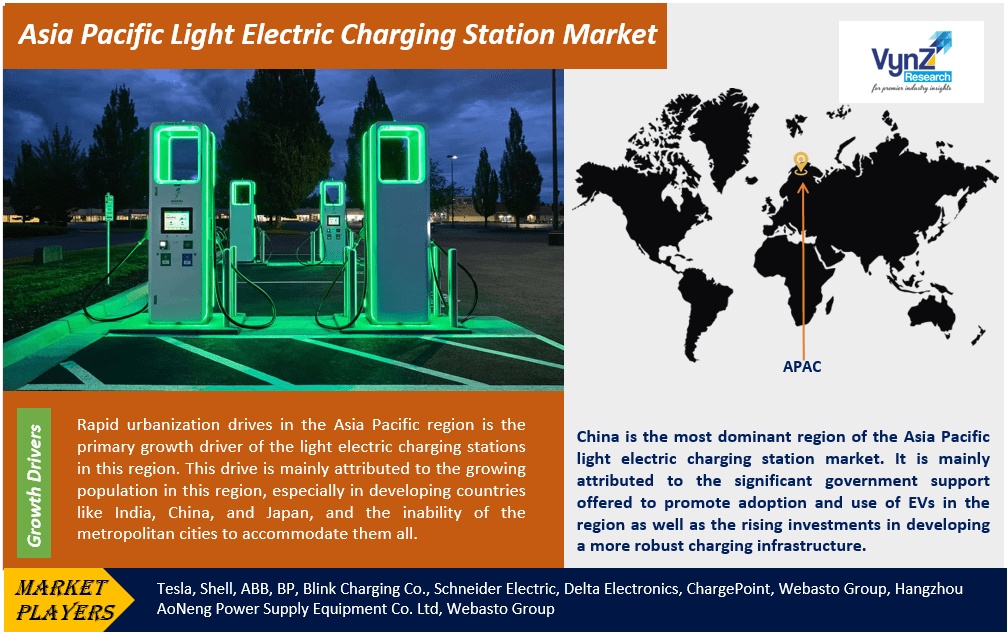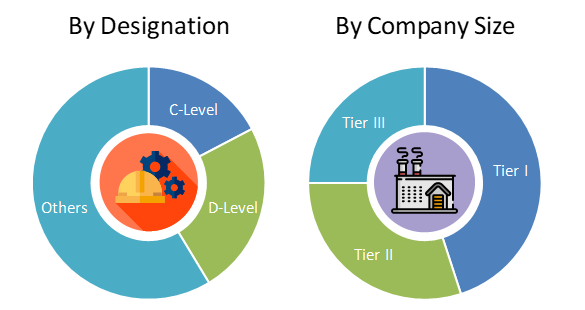| Status : Published | Published On : Nov, 2024 | Report Code : VRAT9639 | Industry : Automotive & Transportation | Available Format :

|
Page : 95 |

Asia Pacific Light Electric Charging Station Market Size & Share | Growth Forecast Report 2030
Industry Insights By Charging Station Type (Public, Private, and Semi-Public), By Charging Technology (Level 2 Charging, DC Fast Charging Technologies), By Application (Residential, Commercial, and Public Applications), By End Users (Individual Consumers, Fleet Operators, and Businesses) and By Geography (China, India, Japan and South Korea)
Industry Overview
The Asia Pacific Light Electric Charging Station Market size was valued at USD 8.9 billion in 2023. It is likely to grow up to USD 23.5 billion by 2030 at a CAGR of 18.4% during the forecast period ranging between 2025 and 2030. The growth of the market is facilitated by the growing adoption and use of EVs in this region especially by the growing middle-class populace, especially in India, Indonesia, and other developing countries. The pace of growth is further expedited by the rising income levels of people along with the growing awareness of the benefits of using EVs and environmental impacts. This rising demand is pushing the requirement for more developed charging infrastructure and stations to cater to the ever-growing consumer base of new EVs.

Charging the rising number of electric vehicles (EVs) quickly needs an efficient and advanced charging solution and a light electric vehicle charging stations is just the right one. These charging stations are designed with cutting-edge charging technology, typically using sustainable and renewable energy sources. The quick charging ability of the charging stations reduces wait times making them extremely convenient for passengers and drivers alike. Typically deployed in malls, tourist areas, commercial districts and transportation hubs, these charging stations help promote energy-efficient mobility and meet the demand for sustainable and clean energy to charge EVs by reducing carbon footprints and vehicle emissions thereby reducing environmental impacts.
Asia Pacific Light Electric Charging Station Market Report Coverage
|
Report Metric |
Details |
|
Historical Period |
2018 - 2023 |
|
Base Year Considered |
2024 |
|
Forecast Period |
2025 - 2030 |
|
Market Size in 2024 |
U.S.D. 8.9 Billion |
|
Revenue Forecast in 2030 |
U.S.D. 23.5 Billion |
|
Growth Rate |
18.4% |
|
Segments Covered in the Report |
By Charging Station Type, By Charging Technology, By Application, By End Users |
|
Report Scope |
Market Trends, Drivers, and Restraints; Revenue Estimation and Forecast; Segmentation Analysis; Impact of COVID-19; Companies’ Strategic Developments; Market Share Analysis of Key Players; Company Profiling |
|
Regions Covered in the Report |
China, India, Japan and South Korea |
Asia Pacific Light Electric Charging Station Industry Dynamics
Asia Pacific Light Electric Charging Station Market Trends/ Growth Drivers:
Rising adoption of EVs and rapid urbanization drives
Rapid urbanization drives in the Asia Pacific region is the primary growth driver of the light electric charging stations in this region. This drive is mainly attributed to the growing population in this region, especially in developing countries like India, China, and Japan, and the inability of the metropolitan cities to accommodate them all. This needs higher investment in sustainable mobility solutions like EVs in the urban regions alongside the development drives, which spurs the demand for a large number of charging stations, mainly in highly congested areas. In addition, strong government support to promote clean energy solutions and green mobility through substantial subsidies and tax rebates offered to the EV buyers and charging network establishments by key players of the market in countries like China, Japan, and South Korea through solo or public-private partnerships also promote the market growth.
Asia Pacific Light Electric Charging Station Market Challenges
Lack of standardization and uneven infrastructure development
In the Asia Pacific region, one of the most significant challenges that is slowing down the light electric charging station market is the absence of standardization and uneven infrastructure development. For example, development in charging infrastructure is rampant in China, while developing countries like India and Southeast Asia lags significantly behind. This affects the consistency and standardization of charging network which, coupled with the inadequate electric grid setup in a few areas, causes inadequacies in charging operations. In addition, absence of skilled workers to maintain and manage these modern and sophisticated charging stations adds to the operational challenges, thereby slowing down adoption and market growth.
Asia Pacific Light Electric Charging Station Market Opportunities
Supportive government strategies and technological developments
Despite the challenges, the Asia Pacific light electric charging station market is offered significant growth opportunities by the supportive government strategies designed to promote adoption of EVs across different regions. For example, China is aiming to become the world leader in EV usage and sales, which is creating a high demand for more developed light EV charging networks. In the same way, the National Electric Mobility Mission Plan (NEMMP) of India is helping promote electric mobility in the region. In addition, technological developments in charging technology is improving charging speeds. It is also offering wireless charging solutions adding to the convenience of the users. All these are opening novel avenues for the market to grow during the forecast period due to reduced user and entry barriers in the region.
Asia Pacific Light Electric Charging Station Market Segmentation
VynZ Research provides an analysis of the key trends in each segment of the Asia Pacific Light Electric Charging Station Market report, along with forecasts at the regional and country levels from 2025-2030. Our report has categorized the market based on Charging Station Type, Charging Technology, Application and End Users.
Insight by Charging Station Type
- Public
- Private
- Semi-Public
Public charging stations category due to higher government support
The Asia Pacific light electric charging station market is divided by diverse types of charging stations into Public, Private, and Semi-Public categories, dominated by the public charging stations category due to higher government support, investments, partnerships between charging infrastructure providers and EV makers, urbanization drives and adoption of EV especially in China, Japan, and India.
Insight by Charging Technology
- Level 2 Charging
- DC Fast Charging
DC Fast Charging dominates due to higher deployment
According to the charging technologies, the Asia Pacific light electric charging station market is divided into Level 2 Charging and DC Fast Charging technologies, where the latter dominates due to higher deployment in urban areas as well as highways to cater to the rising demand for charging EVs travelling long distance. The growth is also attributed to the rising government funding and the growing need across the region.
Insight by Application
- Residential
- Commercial
- Public
Residential charging segment dominates due to the larger share
The Asia Pacific light electric charging station market is split by application into Residential, Commercial, and Public Applications segments. Out of these segments, the residential charging segment dominates due to the larger share, especially in Australia, and the higher focus on home charging solutions. The higher adoption and use of EVs as well as the supportive policies to promote clean and green transportation within the region by different governments to ensure sustainability and reduce environmental impact is also expected to promote the market growth during the forecast period.
Insight by End Users
- Individual Consumers
- Fleet Operators
- Businesses
Individual consumers dominate due to higher adoption
In addition to the above, the Asia Pacific light electric charging station market can also be segregated by end users into Individual Consumers, Fleet Operators, and Businesses where the individual consumers dominate due to higher adoption, availability of different models, growing awareness of the benefits of EVs, and better green mobility plans and tax discounts.
Asia Pacific Light Electric Charging Station Market: Geographic Overview
China is the most dominant region of the Asia Pacific light electric charging station market. It is mainly attributed to the significant government support offered to promote adoption and use of EVs in the region as well as the rising investments in developing a more robust charging infrastructure.
India, on the other hand, is the most promising region also due to strong government support for Ev adoption and use. In addition, rapid urbanization drive to meet the accommodation needs for the rising urban population and greater emphasis on green transportation policies is also promoting the market growth, especially in tier-1 and metropolitan cities.
Specific regions in Japan and South Korea are also showing significant growth prospects in this specific sector due to strong initiatives by the government, innovative technological capabilities, and growing EV adoption.
Competitive Insights of Asia Pacific Light Electric Charging Station Market :
- Tesla
- Shell
- ABB
- BP
- Blink Charging Co.
- Schneider Electric
- Delta Electronics
- ChargePoint
- Webasto Group
- Hangzhou AoNeng Power Supply Equipment Co. Ltd
- Webasto Group
PRIMARY RESEARCH INTERVIEWS - BREAKDOWN

Frequently Asked Questions
Purchase Options
Latest Report
Research Methodology
- Desk Research / Pilot Interviews
- Build Market Size Model
- Research and Analysis
- Final Deliverabvle
Connect With Our Sales Team
- Toll-Free: 1 888 253 3960
- Phone: +91 9960 288 381
- Email: enquiry@vynzresearch.com
Asia Pacific Light Electric Charging Station Market
